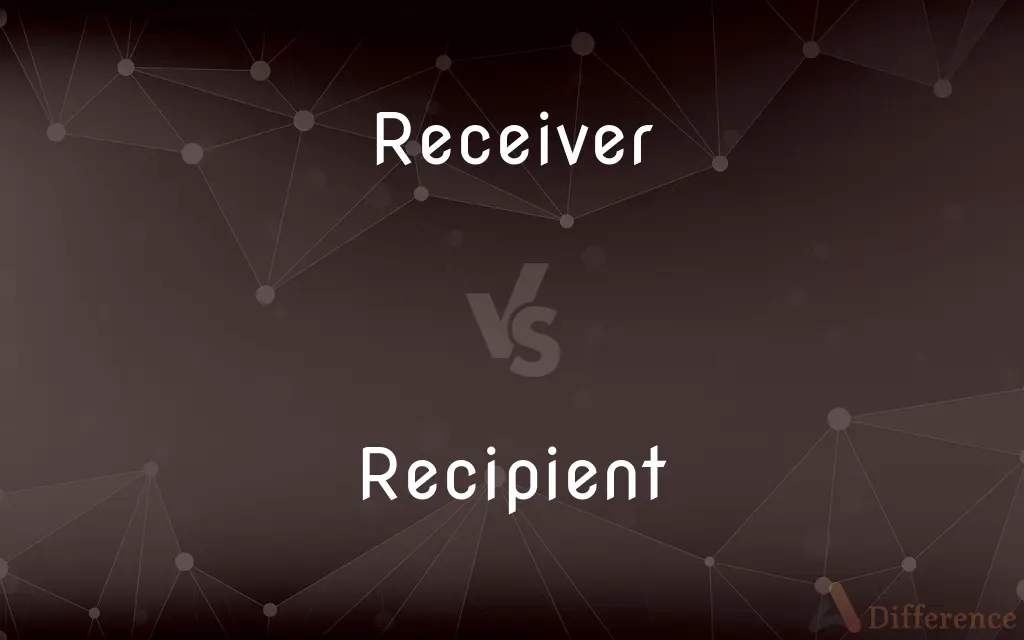Receiver vs. Recipient — What's the Difference?
By Tayyaba Rehman — Updated on October 12, 2023
A "Receiver" is someone or something that receives, often in a technical or formal capacity. A "Recipient" is a person or entity that gets something, typically a message, award, or gift.

Difference Between Receiver and Recipient
Table of Contents
ADVERTISEMENT
Key Differences
The term "Receiver" often points to a more functional or technical aspect. For instance, a receiver in electronics refers to an apparatus that receives signals. On the other hand, a "Recipient" usually denotes someone who is at the receiving end of a gesture, item, or communication.
A "Receiver" can be both an individual or an object, depending on the context. For instance, in football, a wide receiver catches passes. Conversely, a "Recipient" primarily references an individual or organization, especially in contexts of awards, emails, or donations.
In legal contexts, a "Receiver" might be appointed to manage assets, especially in bankruptcy or similar financial circumstances. A "Recipient," in many legal scenarios, refers to someone who receives benefits, be it from a will or a trust.
From a communication standpoint, while both "Receiver" and "Recipient" can denote someone getting a message, the former often leans more towards the process or mechanism of receiving. The latter, "Recipient," zeroes in on the entity being communicated to.
In daily use, if someone gets a package, they could be called either a "Receiver" or a "Recipient." However, "Recipient" is more personal, implying they were the intended party, while "Receiver" simply denotes the act or capability of receiving.
ADVERTISEMENT
Comparison Chart
Primary Use
Technical or functional aspect
Receiving items, messages, awards, or benefits
Context
Both objects and individuals
Primarily individuals or organizations
Legal Usage
Management of assets, especially in financial woes
Beneficiary of trusts, wills, etc.
Communication
Emphasizes the process or mechanism of receiving
Focuses on the intended party being communicated
Personal Touch
Less personal, more about the action
More about the intended individual or entity
Compare with Definitions
Receiver
An apparatus that receives signals or transmissions.
The radio receiver picked up a distant station.
Recipient
A person who gets something, like an award or gift.
The recipient of the scholarship was overjoyed.
Receiver
A person who gets something, often in a more general sense.
As the receiver of the award, Jane felt honored.
Recipient
A person who benefits from something.
As a recipient of the community's generosity, he felt a need to give back.
Receiver
A part of a firearm designed to accommodate the trigger mechanism and provide support.
The rifle's receiver was intricately designed.
Recipient
An organism that receives genetic material in a transplant.
The heart transplant was successful, and the recipient is recovering well.
Receiver
The part of a telephone apparatus contained in the earpiece, in which electrical signals are converted into sounds.
Recipient
A person who gets a service or advantage.
The aid program was designed for recipients below the poverty line.
Receiver
A person who gets or accepts something that has been sent or given to them
The receiver of a gift
Recipient
An individual who receives a communication, letter, or message.
The email was mistakenly sent to the wrong recipient.
Receiver
A person or company appointed by a court to manage the financial affairs of a business or person that has gone bankrupt
The company is in the hands of the receivers
Recipient
One that receives or is given something
Recipients of the award.
Receiver
A container for collecting the products of distillation, chromatography, or other process.
Recipient
One who receives blood, tissue, or an organ from a donor.
Receiver
The part of a firearm which houses the action and to which the barrel and other parts are attached.
Recipient
Functioning as a receiver; receptive.
Receiver
One that receives something:a receiver of many compliments.
Recipient
One who receives.
The recipient of money or goods
My e-mail never reached the intended recipient.
Receiver
A device, such as a part of a radio, television set, or telephone, that converts incoming electromagnetic signals into sound, light, or electrical signals.
Recipient
(medicine) An individual receiving donor organs or tissues.
Receiver
A person appointed by a court to receive and responsibly administer funds or property connected with ongoing litigation.
Recipient
(chemistry) The portion of an alembic or other still in which the distilled liquid is collected.
Receiver
A person who knowingly buys or receives stolen goods.
Recipient
Receiving
Receiver
A receptacle intended for a specific purpose.
Recipient
A receiver; the person or thing that receives; one to whom, or that to which, anything is given or communicated; specifically, the receiver of a still.
Receiver
(Football)A member of the offensive team eligible to catch a forward pass.
Recipient
Receiving; receptive.
Receiver
(Sports)A player who receives a pass.
Recipient
A person who gets something
Receiver
(Baseball)The catcher.
Recipient
The semantic role of the animate entity that is passively involved in the happening denoted by the verb in the clause
Receiver
A person.
Receiver
An official whose job is to receive taxes or other monies; a tax collector, a treasurer.
Receiver
A person who receives something in a general sense; a recipient.
Receiver
A person who accepts stolen goods.
Receiver
A person or company appointed to settle the affairs of an insolvent entity.
Receiver
(American football) An offensive player who catches the ball after it has been passed.
Receiver
(racquet sports) A person who attempts to return the serve.
Receiver
An item or apparatus.
Receiver
Something which receives some substance or object, in a general sense; a receptacle.
Receiver
(chemistry) A vessel for receiving and holding the products of distillation, or for containing gases.
Receiver
An airtight vessel from which air is pumped in order to form a vacuum.
Receiver
(firearms) The part of a firearm containing the action.
Receiver
A vessel for receiving the exhaust steam from the high-pressure cylinder before it enters the low-pressure cylinder, in a compound steam engine.
Receiver
Any of several electronic devices that receive electromagnetic waves, or signals transmitted as such.
Receiver
The part of a telephone handset contained in the earpiece; hence the handset itself; an earpiece.
Receiver
(finance) A swaption which gives its holder the option to enter into a swap in which they pay the floating leg and receive the fixed leg.
Receiver
One who takes or receives in any manner.
Receiver
A person appointed, ordinarily by a court, to receive, and hold in trust, money or other property which is the subject of litigation, pending the suit; a person appointed to take charge of the estate and effects of a corporation, and to do other acts necessary to winding up its affairs, in certain cases.
Receiver
One who takes or buys stolen goods from a thief, knowing them to be stolen.
Receiver
A vessel connected with an alembic, a retort, or the like, for receiving and condensing the product of distillation.
Receiver
The glass vessel in which the vacuum is produced, and the objects of experiment are put, in experiments with an air pump. Cf. Bell jar, and see Illust. of Air pump.
Receiver
A vessel for receiving the exhaust steam from the high-pressure cylinder before it enters the low-pressure cylinder, in a compound engine.
Receiver
That portion of a telephonic apparatus, or similar system, at which the message is received and made audible; - opposed to transmitter.
Receiver
In portable breech-loading firearms, the steel frame screwed to the breech end of the barrel, which receives the bolt or block, gives means of securing for firing, facilitates loading, and holds the ejector, cut-off, etc.
Receiver
Set that receives radio or tv signals
Receiver
(law) a person (usually appointed by a court of law) who liquidates assets or preserves them for the benefit of affected parties
Receiver
Earphone that converts electrical signals into sounds
Receiver
A person who gets something
Receiver
A football player who catches (or is supposed to catch) a forward pass
Receiver
A person designated to handle certain financial matters, often in cases of bankruptcy.
The court appointed a receiver to manage the company's assets.
Receiver
A player position in certain sports, like football.
The quarterback threw the ball to the receiver.
Common Curiosities
Are "Receiver" and "Recipient" synonyms?
While similar, they're not always interchangeable. "Receiver" often has a technical connotation, while "Recipient" is about getting something intended for them.
Can a "Receiver" be an inanimate object?
Yes, like a satellite receiver.
Who is the "Recipient" in an email?
The person to whom the email is addressed is the recipient.
Is a phone a "Receiver"?
Historically, the part of a telephone held to the ear was called a "Receiver."
Is a "Recipient" always human?
No, it can be an organization or even an organism in medical contexts.
Who becomes the "Recipient" of a donation?
The individual or entity the donation is given to.
Can a company be a "Recipient"?
Yes, a company can be a recipient of an award, grant, or message.
Can a "Receiver" denote a position of responsibility?
In legal and financial contexts, a receiver might be tasked with managing assets.
Can a "Receiver" reject what they are receiving?
Yes, like when someone declines a phone call. However, the act of rejecting doesn't negate them being the initial receiver.
How are "Recipient" and "Receiver" used differently in shipping?
A "Recipient" is the intended individual or entity for a package, while "Receiver" can simply mean the party (person or entity) that physically accepts the delivery, whether or not they are the intended recipient.
Why might someone be designated a "Receiver" in a legal context?
Often, in cases of bankruptcy or financial distress, a receiver is appointed to manage and protect assets.
Can "Receiver" be used in sports?
Yes, like in football where a player catching passes is a receiver.
What's the difference between the "Receiver" of a phone call and the "Recipient" of a message?
The "Receiver" usually refers to the apparatus or individual answering the call, while the "Recipient" is the intended individual for whom the message is meant.
Can a person be both a "Receiver" and a "Recipient"?
Yes, if someone is both the intended party for something and also the one who physically or technically receives it.
What's a commonality between "Receiver" and "Recipient"?
Both denote the act or state of getting something.
Is a "Recipient" always the final end-user?
Not always. A recipient could forward what they've received to another party.
Is the "Recipient" of a letter always the person it's addressed to?
Typically, yes. The recipient is the person or entity to whom the letter is intended.
In what scenario might a "Receiver" not be a "Recipient"?
If someone intercepts a message or package not intended for them, they are the receiver but not the intended recipient.
Can organizations be both "Receivers" and "Recipients"?
Yes. An organization can technically receive something (be the receiver) and also be the intended party (be the recipient).
Share Your Discovery

Previous Comparison
Disbelief vs. Disbelieve
Next Comparison
Joint vs. DoobieAuthor Spotlight
Written by
Tayyaba RehmanTayyaba Rehman is a distinguished writer, currently serving as a primary contributor to askdifference.com. As a researcher in semantics and etymology, Tayyaba's passion for the complexity of languages and their distinctions has found a perfect home on the platform. Tayyaba delves into the intricacies of language, distinguishing between commonly confused words and phrases, thereby providing clarity for readers worldwide.














































